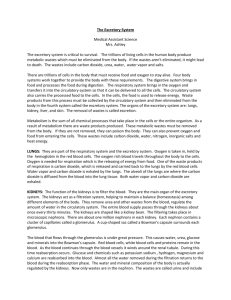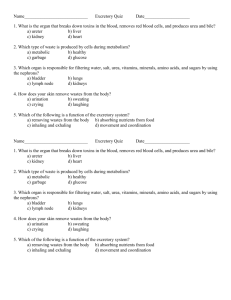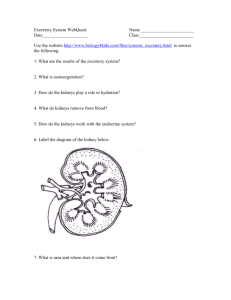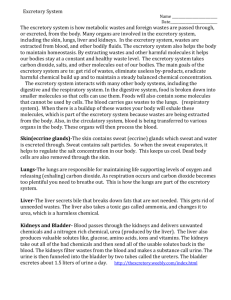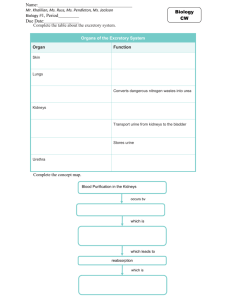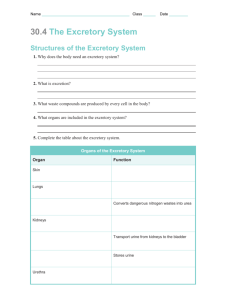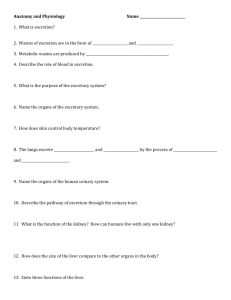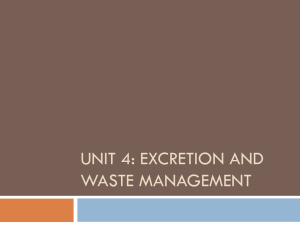Cross-Curricular Reading Comprehension Worksheets: E
advertisement
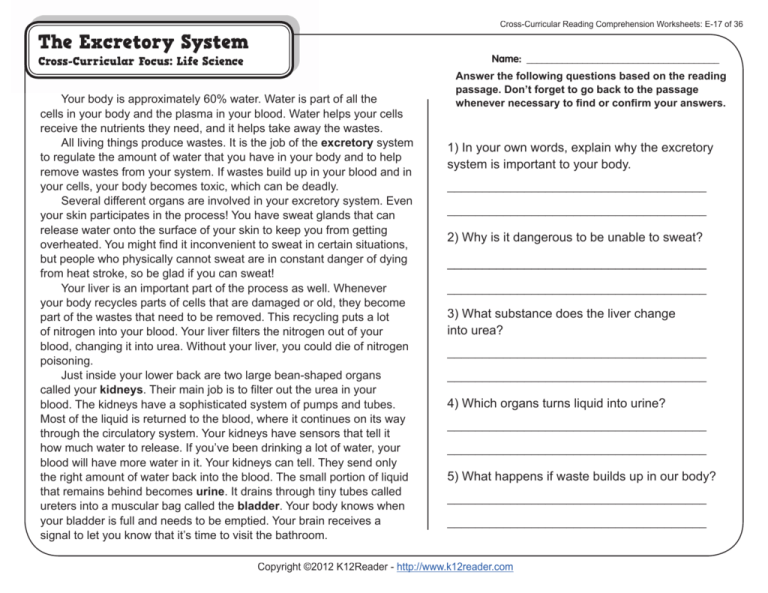
Cross-Curricular Reading Comprehension Worksheets: E-17 of 36 The Excretory System Cross-Curricular Focus: Life Science Name: ______________________________________ Your body is approximately 60% water. Water is part of all the cells in your body and the plasma in your blood. Water helps your cells receive the nutrients they need, and it helps take away the wastes. All living things produce wastes. It is the job of the excretory system to regulate the amount of water that you have in your body and to help remove wastes from your system. If wastes build up in your blood and in your cells, your body becomes toxic, which can be deadly. Several different organs are involved in your excretory system. Even your skin participates in the process! You have sweat glands that can release water onto the surface of your skin to keep you from getting overheated. You might find it inconvenient to sweat in certain situations, but people who physically cannot sweat are in constant danger of dying from heat stroke, so be glad if you can sweat! Your liver is an important part of the process as well. Whenever your body recycles parts of cells that are damaged or old, they become part of the wastes that need to be removed. This recycling puts a lot of nitrogen into your blood. Your liver filters the nitrogen out of your blood, changing it into urea. Without your liver, you could die of nitrogen poisoning. Just inside your lower back are two large bean-shaped organs called your kidneys. Their main job is to filter out the urea in your blood. The kidneys have a sophisticated system of pumps and tubes. Most of the liquid is returned to the blood, where it continues on its way through the circulatory system. Your kidneys have sensors that tell it how much water to release. If you’ve been drinking a lot of water, your blood will have more water in it. Your kidneys can tell. They send only the right amount of water back into the blood. The small portion of liquid that remains behind becomes urine. It drains through tiny tubes called ureters into a muscular bag called the bladder. Your body knows when your bladder is full and needs to be emptied. Your brain receives a signal to let you know that it’s time to visit the bathroom. Answer the following questions based on the reading passage. Don’t forget to go back to the passage whenever necessary to find or confirm your answers. 1) In your own words, explain why the excretory system is important to your body. _____________________________________ _____________________________________ 2) Why is it dangerous to be unable to sweat? _____________________________________ _____________________________________ 3) What substance does the liver change into urea? _____________________________________ _____________________________________ 4) Which organs turns liquid into urine? _____________________________________ _____________________________________ 5) What happens if waste builds up in our body? _____________________________________ _____________________________________ Copyright ©2012 K12Reader - http://www.k12reader.com Cross-Curricular Reading Comprehension Worksheets: E-17 of 36 The Excretory System Key Name: ______________________________________ Cross-Curricular Focus: Life Science Your body is approximately 60% water. Water is part of all the cells in your body and the plasma in your blood. Water helps your cells receive the nutrients they need, and it helps take away the wastes. All living things produce wastes. It is the job of the excretory system to regulate the amount of water that you have in your body and to help remove wastes from your system. If wastes build up in your blood and in your cells, your body becomes toxic, which can be deadly. Several different organs are involved in your excretory system. Even your skin participates in the process! You have sweat glands that can release water onto the surface of your skin to keep you from getting overheated. You might find it inconvenient to sweat in certain situations, but people who physically cannot sweat are in constant danger of dying from heat stroke, so be glad if you can sweat! Your liver is an important part of the process as well. Whenever your body recycles parts of cells that are damaged or old, they become part of the wastes that need to be removed. This recycling puts a lot of nitrogen into your blood. Your liver filters the nitrogen out of your blood, changing it into urea. Without your liver, you could die of nitrogen poisoning. Just inside your lower back are two large bean-shaped organs called your kidneys. Their main job is to filter out the urea in your blood. The kidneys have a sophisticated system of pumps and tubes. Most of the liquid is returned to the blood, where it continues on its way through the circulatory system. Your kidneys have sensors that tell it how much water to release. If you’ve been drinking a lot of water, your blood will have more water in it. Your kidneys can tell. They send only the right amount of water back into the blood. The small portion of liquid that remains behind becomes urine. It drains through tiny tubes called ureters into a muscular bag called the bladder. Your body knows when your bladder is full and needs to be emptied. Your brain receives a signal to let you know that it’s time to visit the bathroom. Answer the following questions based on the reading passage. Don’t forget to go back to the passage whenever necessary to find or confirm your answers. Actual wording of answers may vary. 1) In your own words, explain why the excretory system is important to your body. It removes harmful waste from the body and _____________________________________ keeps us cool. _____________________________________ 2) Why is it dangerous to be unable to sweat? If you couldn’t sweat, your body would not be _____________________________________ able to cool itself. You could overheat and die. _____________________________________ 3) What substance does the liver change into urea? nitrogen _____________________________________ _____________________________________ 4) Which organs turns liquid into urine? the kidneys _____________________________________ _____________________________________ 5) What happens if waste builds up in our body? Our blood becomes toxic, which could be _____________________________________ deadly. _____________________________________ Copyright ©2012 K12Reader - http://www.k12reader.com
